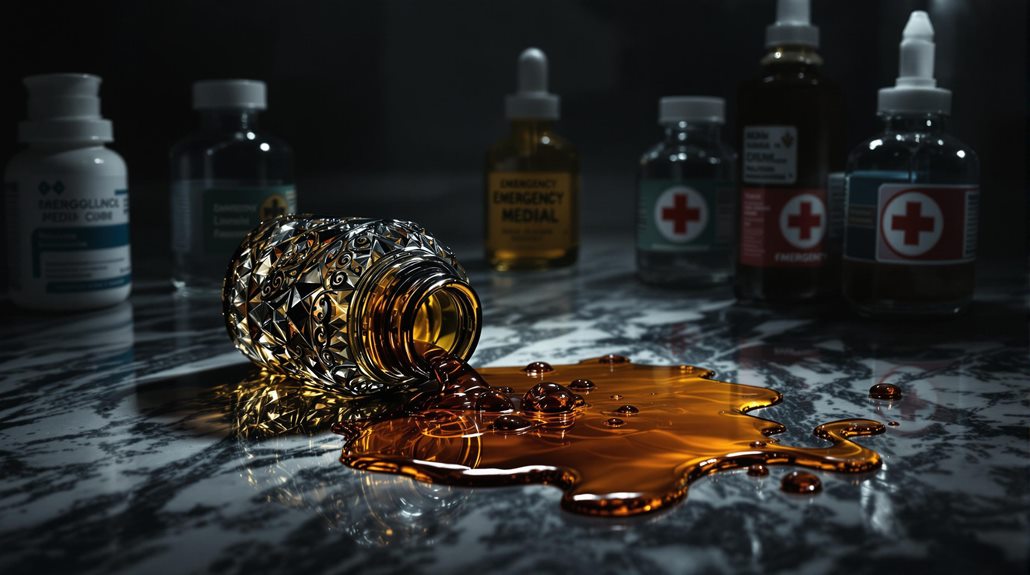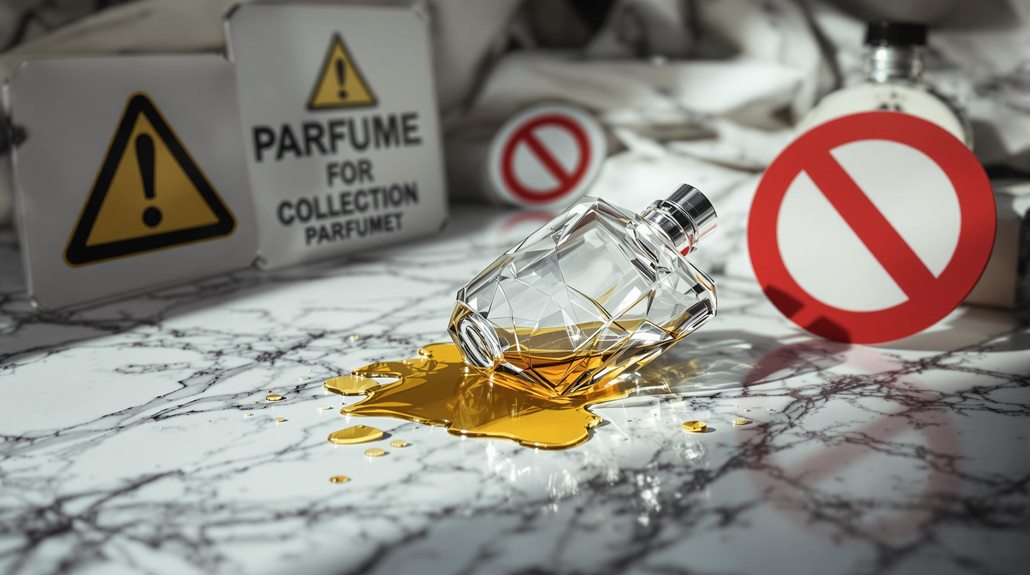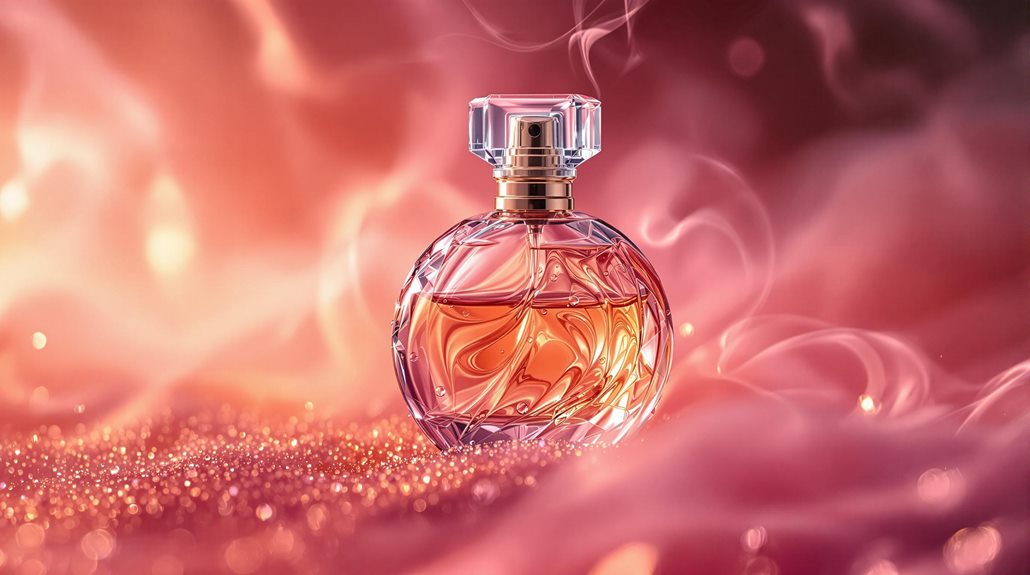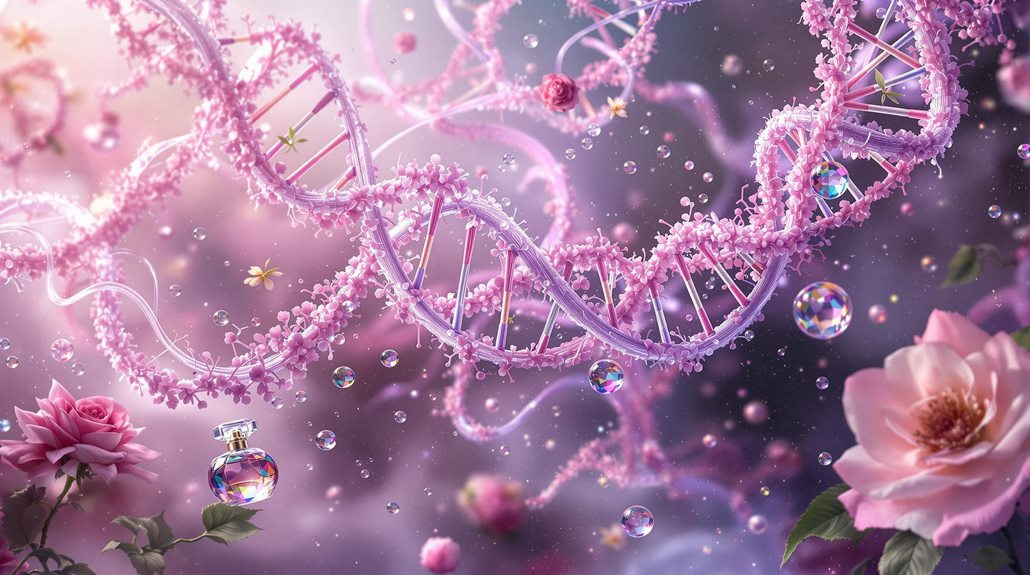What Happens If You Drink Perfume? Health Risks and Effects Explained

Drinking perfume is extremely dangerous and can cause severe alcohol poisoning since perfumes contain high concentrations of ethyl or isopropyl alcohol. You'll likely experience immediate symptoms similar to alcohol intoxication, including dizziness, slurred speech, and lethargy. The toxic ingredients can trigger intense nausea, vomiting, and possible allergic reactions. If you've ingested perfume, especially more than 30 milliliters, you need immediate medical attention. While minor exposures might only require monitoring and fluids, larger amounts can lead to serious complications. Understanding perfume's toxic components and proper safety measures could save your life.
Understanding Perfume's Toxic Components
While perfume is designed to be sprayed on the skin, its ingredients can be dangerous when swallowed. Most fragrance products contain high concentrations of ethyl or isopropyl alcohol, which can lead to severe alcohol poisoning if ingested. These alcohol levels make perfumes particularly hazardous, especially for children who might accidentally consume them.
Beyond alcohol, perfumes harbor numerous poisonous ingredients that manufacturers aren't required to disclose. They can simply list these components under the umbrella term "fragrance," making it difficult for you to know what you're really exposed to. Chemical compounds like phthalates, styrene, and musk ketones are commonly found in perfumes, yet their safety profiles raise serious concerns.
What's more alarming is that research shows only about one-third of common fragrance ingredients have undergone proper toxicity testing. This means you're potentially exposed to chemicals whose health effects aren't fully understood. The Environmental Working Group's findings highlight this significant gap in safety testing, suggesting that many perfume ingredients haven't been adequately evaluated for their potential risks when ingested or even when used as intended.
Immediate Signs of Perfume Poisoning
The toxic ingredients in perfume can trigger immediate and alarming reactions when consumed. If you've ingested fragrance products, you'll likely experience symptoms that closely resemble alcohol intoxication within minutes. You might notice yourself swaying, struggling to speak clearly, or feeling unusually lethargic.
Your body will typically respond to the Perfume ingestion by causing nausea and vomiting as it attempts to expel the harmful substances. You'll likely have breath that smells distinctly of alcohol, which can help medical professionals identify the cause of your symptoms. If you experience these signs, you should contact a poison control center immediately for professional guidance.
Even if you haven't consumed perfume but have had skin contact, you might develop contact dermatitis, characterized by hives, intense itching, and redness at the exposure site. These reactions can range from mild to severe, and while they typically resolve within 48-72 hours with proper care, it is crucial to monitor your symptoms closely. Medical professionals will work to prevent complications like blood sugar from dropping while providing supportive care to manage your symptoms.
When to Seek Medical Help

Seeking prompt medical attention can mean the difference between a minor incident and a serious health emergency when perfume is ingested. If you or someone else has consumed perfume or cologne, you should immediately contact poison control or a physician, particularly if more than a teaspoon has been swallowed. While many cases resolve without complications, certain symptoms demand immediate emergency care.
Watch for these critical warning signs that require an ER visit:
- Severe allergic reactions including widespread hives or difficulty breathing - these can escalate quickly and become life-threatening
- Mental status changes like confusion, slurred speech, or extreme drowsiness - which may indicate dangerous toxicity levels
- Physical symptoms including high fever, rapid heartbeat, severe dizziness, or persistent vomiting - signs your body's having a serious reaction
Don't wait to see if symptoms improve if a reaction occurs - especially in children, who are particularly vulnerable to perfume's toxic ingredients. While permanent damage from a single exposure is uncommon, the ethanol and isopropyl alcohol in fragrances can cause significant poisoning when ingested in quantities over 30 milliliters. Your quick action in seeking medical help can prevent dangerous complications.
Treatment and Recovery Options
According to medical experts, treatment for perfume ingestion varies based on the amount consumed and severity of symptoms. For minor cases where you've consumed a small amount of perfume containing essential oils and a low percentage of alcohol, the primary treatment involves drinking plenty of fluids and eating light snacks while monitoring yourself for any concerning symptoms.
If you've ingested a larger quantity, you'll need professional medical care. Healthcare providers may keep you under overnight observation to monitor your blood sugar levels and watch for potential complications. They'll guarantee you remain properly hydrated and receive appropriate supportive care.
For skin reactions from perfume contact, treatment depends on severity. You can manage mild contact dermatitis at home by immediately stopping exposure to the perfume, gently cleansing the affected area, and applying soothing topicals or over-the-counter hydrocortisone creams. However, if you develop severe reactions or persistent symptoms, don't hesitate to seek medical evaluation. Your doctor may prescribe stronger medications or treatments based on your specific symptoms. The key to perfume prevention and treatment is recognizing when home care is sufficient and when professional intervention becomes necessary.
Prevention and Safety Measures

In light of the serious health risks associated with perfume ingestion, implementing proper safety measures is essential for preventing accidents. If you have fragrance products at home, you'll need to take immediate steps to prevent situations where a child drank perfume. Store all perfumes and colognes in locked cabinets or high shelves where children can't reach them. You shouldn't apply these products around young children, as they might try to mimic your actions.
When it comes to prevention, choose fragrance-free alternatives or products with lower alcohol content whenever possible. Always dispose of empty bottles properly, and don't keep unused fragrances lying around. Remember: all rights reserved extends to protecting those in your care.
- The thought of your child in an emergency room because they accessed your perfume is devastating and preventable
- A moment of carelessness with fragrance product storage could lead to lifelong regret
- Being proactive about safety today means avoiding heartbreaking accidents tomorrow
Remember to educate children about the dangers of these products and never let them handle or apply fragrances independently. Your vigilance in following these safety measures could prevent a life-threatening emergency.
Conclusion
Don't take any chances with perfume ingestion - the toxic chemicals in fragrances can cause severe damage to your body. If you've accidentally swallowed perfume, call poison control immediately and watch for symptoms like vomiting, dizziness, or difficulty breathing. Keep all fragrances safely stored away from children and never store perfumes in beverage containers to prevent dangerous mix-ups.




